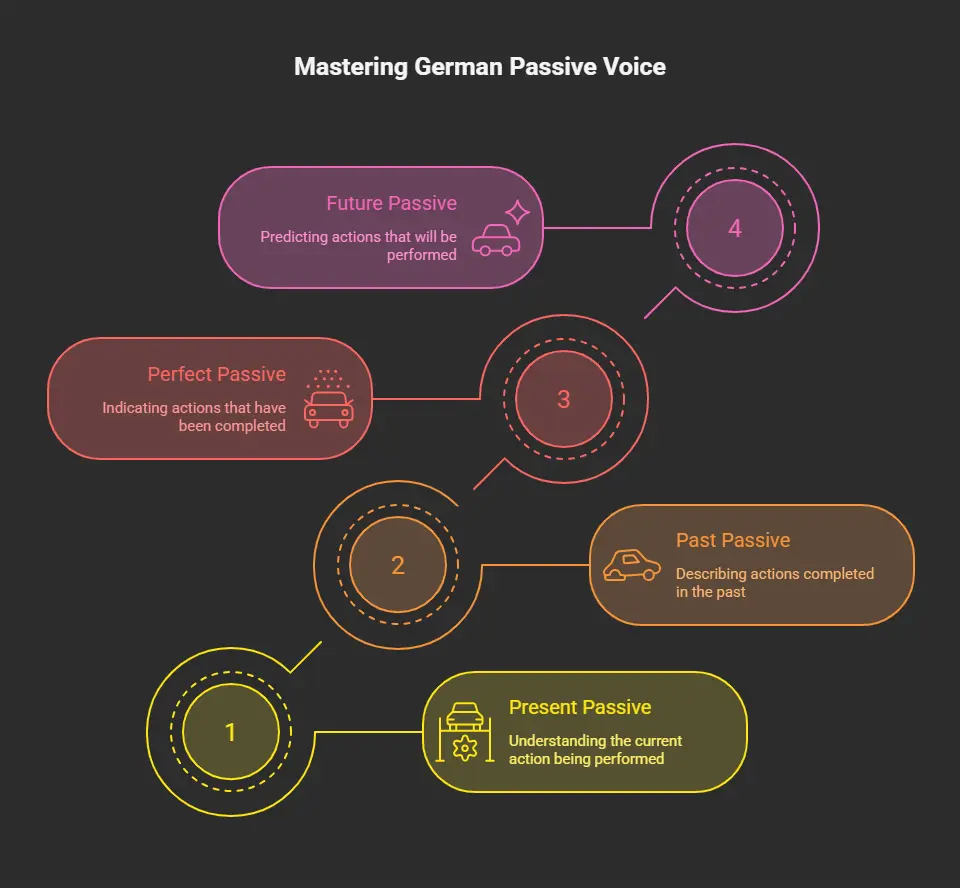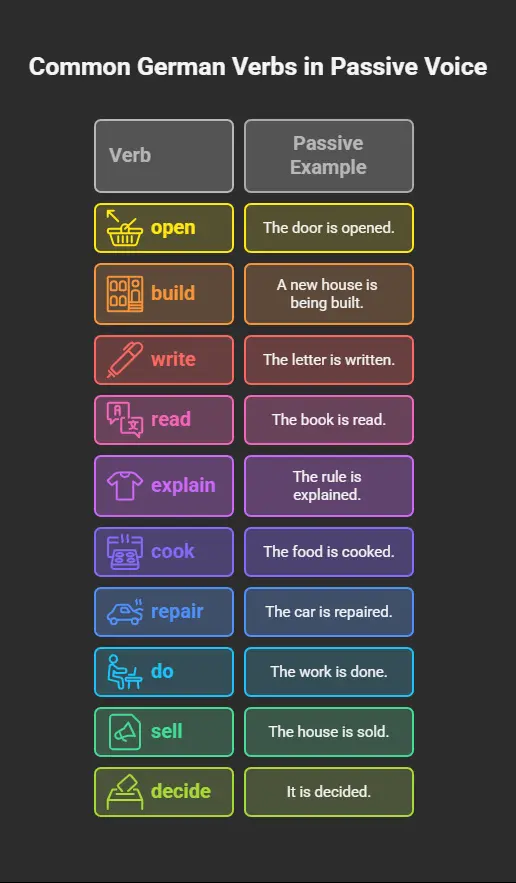Table of Contents
Have you ever read the German phrase and thought why the action is paid for the action instead of the person doing? This is the beauty of passive voice. This helps us to note who is doing something that is being done. In this blog we will run in a simple and clear way from this topic. You will see rules, structures and real examples. Step by step, passive voice will be simple, and towards the end of this blog you will know how to use it naturally in your own sentences.
Master the German Language with Entri App! Click Here for Free Trial Class!
Introduction
When someone learns German, one of the most interesting parts of grammar you will know is a passive voice. First, it may look confusing, but once you understand this idea, it becomes very easy to use. Passive voice is not just about grammar rules. It is also about how we choose to tell a story, how we highlight some details and how we transfer attention to a sentence.
What is Passive Voice?
Passive voice is a way of building sentences where action focuses on themselves, rather than the person or subject doing the action. Instead of asking, “Who does it?”, the passive voice like: “What is being done?”.
For example, in English we say:
-
Active voice: “The teacher explains the lesson.”
-
Passive voice: “The lesson is explained by the teacher.”
In the passive version, our eyes immediately go to the text instead of the teacher. This small shift can change our way of reading and understanding information.
Why and When is it Used in German?
In German, the passive voice plays a very similar role. It is especially useful when:
-
The person doing the action is not important.
-
The person doing the action is unknown.
-
The focus should be on the result, not on who caused it.
For example:
-
Das Buch wird gelesen (The book is being read).
Here we don’t know who reads the book, and that does not matter. What matters is that the reading action is done. It makes the passive voice very common in newspapers, academic texts, reports and situations where the writer wants to make objective or formal. It is also used in daily life interactions when we want to emphasize action instead of the subject.
|
German A2 Exercises – Download Free PDF |
||
Comparing with English Passive Voice
If you already know how to works passive in English. The German passive is designed in a similar way, but there are some significant differences. Both languages use a form of the verb “to be” plus a past participle.
-
English: “The door is opened.”
-
German: “Die Tur wird geoffnet.”
The main difference is auxiliary verb. In English, we use “to be” (is, was, were), while in German uses “werden” as the most passive forms. This is something most of the learners need to get used to, but once you see enough examples, it becomes usual.
Formation of Passive Sentences in German
1: How do you say "Good Morning" in German?
-
In case of active sentences, the focus is on the subject (the “doer”).
-
In case of bpassive sentences, the focus is on the action or the object (what is done).
| Tense | Structure | Example | Translation |
|---|---|---|---|
| Present | werden + Partizip II | Das Auto wird repariert. | The car is repaired / is being repaired. |
| Past (Präteritum) | wurde + Partizip II | Das Auto wurde repariert. | The car was repaired. |
| Perfect | ist + Partizip II + worden | Das Auto ist repariert worden. | The car has been repaired. |
| Future | wird + Partizip II + werden | Das Auto wird repariert werden. | The car will be repaired. |
1. Present Passive (Prasens)
Structure: Subject + werden (present) + Partizip II
| Active Sentence | Passive Sentence | English Translation |
|---|---|---|
| Der Lehrer erklärt die Regel. | Die Regel wird erklart. | The rule is explained / is being explained. |
| Jemand repariert das Auto. | Das Auto wird repariert. | The car is repaired / is being repaired. |
| Die Kinder essen den Kuchen. | Der Kuchen wird gegessen. | The cake is eaten / is being eaten. |
2. Past Passive (Prateritum / Simple Past)
Structure: Subject + wurde + Partizip II
| Active Sentence | Passive Sentence | English Translation |
|---|---|---|
| Der Lehrer erklarte die Regel. | Die Regel wurde erklart. | The rule was explained. |
| Jemand reparierte das Auto. | Das Auto wurde repariert. | The car was repaired. |
| Die Kinder aßen den Kuchen. | Der Kuchen wurde gegessen. | The cake was eaten. |
3. Perfect Passive (Perfekt)
Structure: Subject + ist + Partizip II + worden
| Active Sentence | Passive Sentence | English Translation |
|---|---|---|
| Der Lehrer hat die Regel erklart. | Die Regel ist erklart worden. | The rule has been explained. |
| Jemand hat das Auto repariert. | Das Auto ist repariert worden. | The car has been repaired. |
| Die Kinder haben den Kuchen gegessen. | Der Kuchen ist gegessen worden. | The cake has been eaten. |
4. Future Passive (Futur I)
Structure: Subject + wird + Partizip II + werden
| Active Sentence | Passive Sentence | English Translation |
|---|---|---|
| Der Lehrer wird die Regel erklaren. | Die Regel wird erklart werden. | The rule will be explained. |
| Jemand wird das Auto reparieren. | Das Auto wird repariert werden. | The car will be repaired. |
| Die Kinder werden den Kuchen essen. | Der Kuchen wird gegessen werden. | The cake will be eaten. |
Free German A1 Mock Tests – Powered by AI!
Test your skills on our interactive platform. Get instant feedback from our AI to help you communicate better and track your progress. Start your free German mock test now.
Test Your German A1 for FreePassive with Modal Verbs
Structure: Subject + modal verb (conjugated) + Partizip II + werden
Explanation with Examples
| Active Sentence | Passive Sentence | English Translation |
|---|---|---|
| Jemand muss das Auto reparieren. | Das Auto muss repariert werden. | The car must be repaired. |
| Man kann die Tur offnen. | Die Tür kann geoffnet werden. | The door can be opened. |
| Jeder soll die Regeln beachten. | Die Regeln sollen beachtet werden. | The rules should be followed. |
| Die Schuler durfen das Handy benutzen. | Das Handy darf benutzt werden. | The phone may be used. |
Why is this useful?
-
Saying “Das Auto muss repariert werden” puts the focus on the fact that the car needs repairing, not on who will repair it.
-
This is especially useful in rules, instructions, or formal texts.
Master the German Language with Entri App! Click Here for Free Trial Class!
Examples with Active vs. Passive Sentences
The biggest difference between active and passive is the focus:
-
Active voice → Focus on the subject (the doer).
-
Passive voice → Focus on the action or the object.
In German, the verb changes from the active form to werden + Partizip II in the passive. The object of the active sentence usually becomes the subject of the passive sentence.
Example1: Present Tense
| Active (Aktiv) | Passive (Passiv) | English Translation |
|---|---|---|
| Der Lehrer erklärt die Regel. | Die Regel wird erklärt. | The teacher explains the rule → The rule is explained. |
Example2: Past Tense
| Active (Aktiv) | Passive (Passiv) | English Translation |
|---|---|---|
| Der Mechaniker reparierte das Auto. | Das Auto wurde repariert. | The mechanic repaired the car → The car was repaired. |
Example 3: Perfect Tense
| Active (Aktiv) | Passive (Passiv) | English Translation |
|---|---|---|
| Jemand hat den Brief geschrieben. | Der Brief ist geschrieben worden. | Someone has written the letter → The letter has been written. |
Example4: Future Tense
| Active (Aktiv) | Passive (Passiv) | English Translation |
|---|---|---|
| Die Polizei wird den Mann verhaften. | Der Mann wird verhaftet werden. | The police will arrest the man → The man will be arrested. |
Keyword order and verb form changes
-
The object of the active → becomes the subject in passive.
-
The verb → changes into werden + Partizip II.
-
The doer (subject in active) → is often left out or added with von + Dativ (“von dem Lehrer” = by the teacher).
Impersonal Passive Sentences
The role of “man”:
Usually in German, the word man (meaning one, people, or they) is often used when the subject is general or unknown.
-
Example: “Man spricht hier Deutsch.” → “People speak German here.”
But in case of passive voice, the subject man is not needed anymore. Rather than, the sentence becomes impersonal.
-
Example: “Hier wird Deutsch gesprochen.” → “German is spoken here.”
Both sentences means the same thing, but the passive version feel more formal and objective.
Why use impersonal passive?
-
When the doer is unknown: “Es wird getanzt.” → “There is dancing / People are dancing.”
-
When the doer is not important: “In dieser Firma wird viel gearbeitet.” → “A lot of work is done in this company.”
-
For general rules or statements: “Hier wird nicht geraucht.” → “Smoking is not allowed here.”
| German Sentence | English Translation |
|---|---|
| Hier wird Deutsch gesprochen. | German is spoken here. |
| In der Bibliothek wird leise gearbeitet. | Work is done quietly in the library. |
| Es wird bald entschieden. | A decision will be made soon. |
| Heute wird nicht gearbeitet. | No work is being done today. |
Free German A1 Mock Tests – Powered by AI!
Test your skills on our interactive platform. Get instant feedback from our AI to help you communicate better and track your progress. Start your free German mock test now.
Test Your German A1 for FreeCommon Verbs Used in Passive
Here is a short list of verbs you will frequently see in the passive:
-
offnen → Die Tur wird geoffnet. (The door is opened.)
-
bauen → Ein neues Haus wird gebaut. (A new house is being built.)
-
schreiben → Der Brief wird geschrieben. (The letter is written.)
-
lesen → Das Buch wird gelesen. (The book is read.)
-
erklaren → Die Regel wird erklart. (The rule is explained.)
-
kochen → Das Essen wird gekocht. (The food is cooked.)
-
reparieren → Das Auto wird repariert. (The car is repaired.)
-
machen → Die Arbeit wird gemacht. (The work is done.)
-
verkaufen → Das Haus wird verkauft. (The house is sold.)
-
entscheiden → Es wird entschieden. (It is decided.)
Tips to Identify Passive Voice
🔹Look for the verb werden + Partizip II
This is the strongest sign of the passive voice. If you see werden followed by a past participle at the end, it’s most likely passive.
-
Das Auto wird repariert. → The car is being repaired.
-
Der Brief wurde geschrieben. → The letter was written.
🔹Focus on the action, not the doer
In passive sentences, the “doer” (the subject in active voice) is often missing or placed with von + Dativ.
-
Die Regel wird erklart (von dem Lehrer). → The rule is explained (by the teacher).
🔹Context Clues
Ask yourself: Is the sentence emphasizing what happens or who does it?
-
Man baut ein Haus. (Active: Someone is building a house.)
-
Ein Haus wird gebaut. (Passive: A house is being built.)
When Not to Use Passive
Even though the passive is common, it is not always the best choice.
1. When the subject is clear and important
- Better to use active: Der Arzt untersucht den Patienten. (The doctor examines the patient.)
2. With intransitive verbs (verbs without a direct object, like gehen, schlafen, kommen)
- You cannot say “Es wird gegangen.” → This is incorrect.
3. In spoken German
- Germans often prefer the active form with man instead of the passive, because it sounds more natural.
- Example: Man spricht hier Deutsch. (People speak German here.) instead of Hier wird Deutsch gesprochen.
|
Goethe 2025 Exam Dates: Multiple Test Centers |
|
| Trivandrum Goethe Exam Dates | Kochi Goethe Exam Dates |
| Chennai Goethe Exam Dates | Coimbatore Goethe Exam Dates |
Quiz or Practice Section
Try to chnage below active sentences into the passive voice. Pay attention to the verb forms and the word order.
Part A: Present Passive
Q1. Der Lehrer erklart die Grammatik.
- Answer: Die Grammatik wird erklart.
Q2. Jemand repariert das Auto.
- Answer: Das Auto wird repariert.
Q3. Die Kinder essen den Kuchen.
- Answer: Der Kuchenwird gegessen.
Part B: Past Passive (Prateritum)
Q4. Der Mechaniker reparierte den Motor.
- Answer: Der Motor wurde repariert.
Q5. Die Polizei kontrollierte die Ausweise.
- Answer: Die Ausweise wurden kontrolliert.
Q6. Maria schrieb den Brief.
- Answer: Der Brief wurde geschrieben.
Part C: Passive with Modal Verbs
Q7. Man muss das Zimmer aufraumen.
- Answer: Das Zimmer muss aufgeraumt werden.
Q8. Jeder soll die Regeln beachten.
- Answer: Die Regeln sollen beachtet werden.
Q9. Jemand kann die Tur Offnen.
- Answer: Die Tur kann geoffnet werden.
Master the German Language with Entri App! Click Here for Free Trial Class!
Conclusion
The passive voice in German is more than just a grammar rule – it is a way to focus from the person taking action to the action itself. It is widely used in everyday languages, formal writing and conditions where the subject is either unknown or insignificant.
The best way to grasp the passive voice is to practice. Try to rewrite active sentences into passive, use them in short writing practices, and should notice how many times they appear in newspapers or books. With the regular practice, the passive voice will no longer feel unfamiliar – it feels natural and a powerful part in your German verbal communication.
Free German A1 Mock Tests – Powered by AI!
Test your skills on our interactive platform. Get instant feedback from our AI to help you communicate better and track your progress. Start your free German mock test now.
Test Your German A1 for FreeFrequently Asked Questions
What is the passive voice in German?
The passive voice is a sentence form where the action is more important than the person doing it. Instead of focusing on the subject (the doer), the sentence highlights the object (what is done). For example: “Das Auto wird repariert” means “The car is being repaired”.
When do we use the passive voice in German?
The passive is used when the person doing the action is unknown, unimportant, or not the focus. It is very common in newspapers, reports, instructions, and formal writing. For example, “Die Tür wird geöffnet” focuses on the door being opened, not on who opens it.
How do you form the passive voice in German?
The passive is formed with the verb werden plus the Partizip II (past participle) of the main verb. The form of werden changes depending on the tense (present, past, perfect, future). For example:
-
Present: “Das Auto wird repariert.”
-
Past: “Das Auto wurde repariert.”
What is the difference between active and passive voice?
- Active voice: Focuses on the subject who does the action. (“Der Mechaniker repariert das Auto.” → The mechanic repairs the car.)
-
Passive voice: Focuses on the action or the object. (“Das Auto wird repariert.” → The car is being repaired.)
How is the German passive different from English passive?
Both languages use a form of “to be” plus a past participle. The main difference is that German uses werden in most passive forms, while English uses “to be.” Example:
-
English: “The book is read.”
-
German: “Das Buch wird gelesen.”
How do modal verbs work with the passive in German?
With modal verbs, the structure changes slightly: modal verb + Partizip II + werden. For example:
-
Active: “Jemand muss das Auto reparieren.”
-
Passive: “Das Auto muss repariert werden.”
What is the best way to practice the passive voice in German?
Start by rewriting active sentences into passive. Then, read German newspapers and highlight passive sentences you find. Practice speaking them aloud or writing your own. Over time, the patterns will become natural, and you’ll be able to use the passive confidently in both speaking and writing.













